新目标英语中考总复习
- 格式:docx
- 大小:64.48 KB
- 文档页数:17
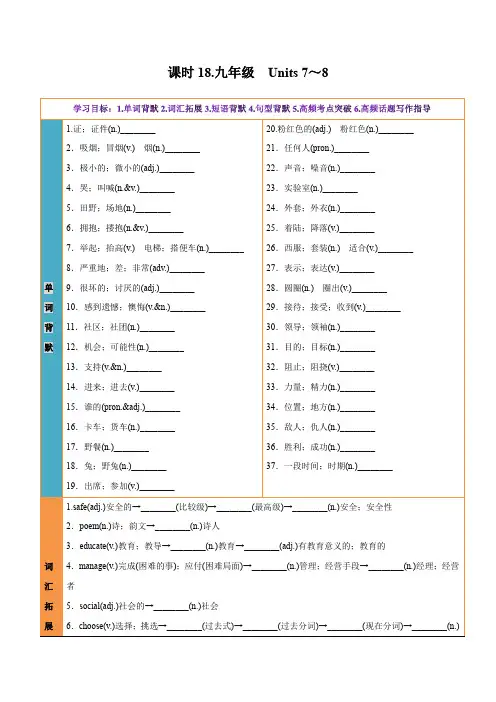
课时18.九年级Units 7~8【答案】一.重点单词1.license 2.smoke 3.tiny 4.cry 5.field 6.hug 7.lift 8.badly 9.awful 10.regret munity 12.chance 13.support 14.enter 15.whose16.truck 17.picnic 18.rabbit 19.attend 20.pink 21.anybody 22.noise boratory 24.coat25.land 26.suit 27.express 28.circle 29.receive 30.leader 31.purpose 32.prevent 33.energy34.position 35.enemy 36.victory 37.period 二.词形百变1.safer safest safety 2.poet3.education educational4.management manager 5.society6.chose chosen choosing choice7.valuable 8.policemen 9.wolves 10.slept sleepy11.medical 三.核心短语1.parttime job 2.get one's ears pierced3.talk back 4.keep... away from5.make one's own decision(s) 6.get in the way of7.run after run away 8.at the same time9.make a choice/choices10.be serious about 11.give sb. a hug12.lift up 13.prevent sb. from doing sth.14.a long period of time 15.manage one's own life16.pick up 17.belong to 18.feel sleepy 四.核心句型1.be allowed to2.should be encouraged don't agree with too to3.get pierced 4.don't think agree disagree5.Whose must 6.can't be7.could be might belong to高频考点突破考点 1 I regret talking back, not listening to Mom. 我后悔顶嘴,不听妈妈的。
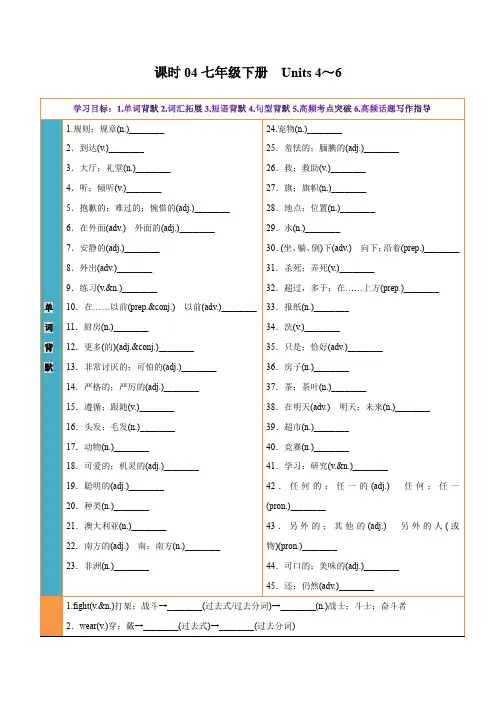
课时04七年级下册Units 4~6高频考点突破考点1 Don't arrive late for class. 上课不要迟到。
The singer arrived in (reached/got to) Sweden the day before yesterday.这位歌手前天到达瑞典。
考点2And we always have to wear the school uniform. 而且我们必须一直穿校服。
考点3Oh, and we also have to be quiet in the library. 哦,而且我们在图书馆也必须保持安静。
考点4Practice the guitar.练习吉他。
考点5There are too many rules! 太多规则了!考点6Parents and schools are sometimes strict, but remember, they make rules to help us. 父母和学校有时是严厉的,但是记住,他们制定规则是为了帮助我们。
Remember to buy a magazine when you come back. 当你回来的时候记得买本杂志。
Do you remember turning off the lights?你记得关灯了吗?She forgot calling me, so she called me again.她忘记给我打过电话了,所以她又给我打了一个。
She forgot to call me.她忘记了给我打电话。
后面可跟动名词,也可跟动词不定式,但意义上相差很大的动词还有stop, go on, need 等。
⎩⎪⎨⎪⎧stop doing sth. 停止做某事stop to do sth. 停下(正在做的事)去做另一件事 ⎩⎪⎨⎪⎧go on doing sth. 接着做某事go on to do sth. 接着做另一件事⎩⎪⎨⎪⎧need to do 需要做……(表示主动,主语为人)need doing =need to be done 需要被做(表示被动,主语为物)考点7At school, I have to wear a school uniform, and I must keep my hair short. 在学校,我不得不穿校服,而且我必须保持短发。

初中新目标英语中考总复习英语版动词+to do 和动词+doing 句型总结一、带动词ing形式1.keep doing2.keep sb. Doing3.practise doing sth.4.enjoy doing5.finish doing6.be afraid of doing7.be busy doing8.look forward to doing9.how about doing、./what about doing10.spend some time (in)doing11.spend some money (in) buying12.feel like doing13.stop/keep/prevent … from doing14.thank sb for doing15.thanks for doing16.dosomecooking/cleaning/reading/shopping/washing 17.goswimming/fishing/shopping/skating/boating18.mind doing19.can’t help doing20.consider doing21.have fun doing sthhave difficulty doing sthhave trouble doing sthhave problem doing sth22.waste time/money doing23.instead of doing 24.miss doing25.hold on to doing26.pay attention to doing27.suggest doing28.It’s time for doing29.There is sb doing sth30.be used to doing sth31.be used for doing sth32. have a lot of experience33. sb allow doing sth34. put off doing sth35. succeed in doing sth36. end up doing37. give up doing38.二.含有不带to的动词不定式句型:1.had better (not) do sth.2.would you please (not) do sth3.why not do sth.4.why don’t you do sth.5.Shall we do sth.?6.let sb do sth.7.make sb. do sth. have sb do sth8.feel sb do sth三、含有带to的动词不定式句型:1.It’s time to do sth.2.It takes sb. some time to do sth3.tell/ ask/ want/encourage/invite/ sb. todo sth.4.Would you like to do sth.?5.It’s good/bad to do sth6.It’s good/bad for sb.to do sth.7.be +adj.+ enough to do sth.8.sb. is ready to do sth.9.It’s + adj.+ for sb. to do sth.10.It’s + adj.+ of sb. to do sth11.would like/love /decide/want/wish/to dosth.12.would like/love sb. to do sth.13.Prefer to do sth. rather than do sth.14.how/ when/where/whether to do sth15.can’t wait to do16.too … to do …17.be afraid /ready/able/sure to do18.It’s time to do sth19.My job is to do sth20.My dream is to do sth21.My hobby is to do sth22.refuse to do sth23.warn sb to do sth24.pretend to do sth25..teach/learn to do sth26.need to do sth27.be willing to do sth28..try to do sth29.try one’s best to do sth30.agree to do sth31.seem to do sth32.plan to do sth /make a plan to do sth33.in order to do sth34.have a chance to do sth35.find it +adj + for sb to do sth36.have sth to do37.There is sth for sb to do38.be anxious to do39.afford to do sth40.两个动作连用,表目的ed to do sth42.be used to do sth43.be supposed to do sth44.allow sb to do sth45.sb be allowed to do sth46.the best way is to do sth47.the next step is to do sth48.have nothing to do with49.the first thing is to do sth50.it’s best to do sth51.it’s a good time to do sth52.it is a good way to do sth53.add to do54.urge sb to docate sb to do56.wait for sb to do57.order sb to do58.happen to do sth59.lead sb to do sth60.it’ a good place to do sth61.invite sb to do62.get to do sth63.expect to do64.volunteer to do sth 65.offer to do sth66.have an opportunity to do67.get sb to do sth68.it’s one’s duty to do sthe sth to do sth70.be sure to do sth71.have to do sth72.be able/unable to do sth四、既用带to的动词不定式又用ing形式的句型:1.stop to do/ doing2.forget to do/ doing3.remember to do/doing4.go on to do/doing5.like to do/doing6.love to do/doing7.prefer to do/doing8.hate to do/doing五、下列结构用带to的动词不定式和ing形式含义相同:、1..begin to do/doing2.start to do/doing3.continue to do/doing4.take turns to do/doing六、既用不带to的动词不定式又用现在分词的句型:用不带to的动词不定式强调动作的完成过程;用现在分词强调动作的进行状态。
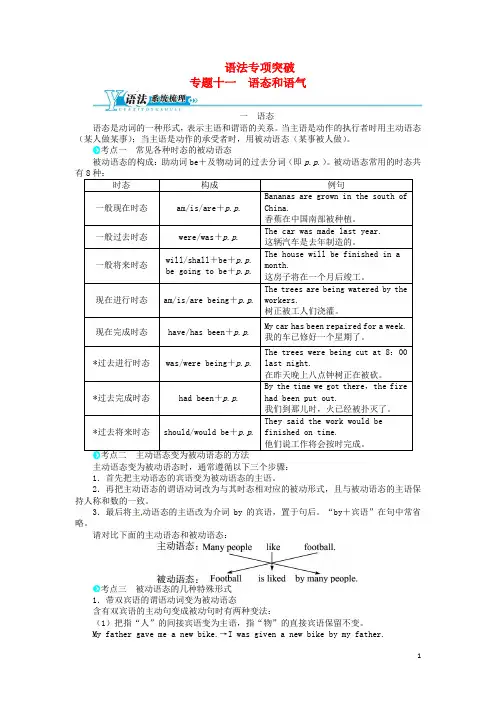
语法专项突破专题十一 语态和语气一 语态语态是动词的一种形式,表示主语和谓语的关系。
当主语是动作的执行者时用主动语态(某人做某事);当主语是动作的承受者时,用被动语态(某事被人做)。
考点一 常见各种时态的被动语态被动语态的构成:助动词be +及物动词的过去分词(即p .p .)。
被动语态常用的时态共主动语态变为被动语态时,通常遵循以下三个步骤:1.首先把主动语态的宾语变为被动语态的主语。
2.再把主动语态的谓语动词改为与其时态相对应的被动形式,且与被动语态的主语保持人称和数的一致。
3.最后将主动语态的主语改为介词by 的宾语,置于句后。
“by+宾语”在句中常省略。
请对比下面的主动语态和被动语态:考点三 被动语态的几种特殊形式1.带双宾语的谓语动词变为被动语态含有双宾语的主动句变成被动句时有两种变法:(1)把指“人”的间接宾语变为主语,指“物”的直接宾语保留不变。
My father gave me a new bike.→I was given a new bike by my father.我爸爸给了我一辆新自行车。
(2)把指“物”的直接宾语变为主语,间接宾语前要加介词to(在send,pass,write,give,show,bring等动词之后)或for(在buy,cook,make,order,choose等动词之后)。
My teacher gave me some advice.→Some advice was given to me by my teacher.老师给了我一些建议。
Mary bought me a new book.→A new book was bought for me by Mary.玛丽给我买了一本新书。
2.含有复合宾语的主动语态变被动语态(1)含有复合宾语的主动语态变为被动语态时,要将其中的宾语变成主语,宾语补足语不变。
Jim asked Tom to go for a walk.→Tom was asked by Jim to go for a walk.吉姆叫汤姆去散步。
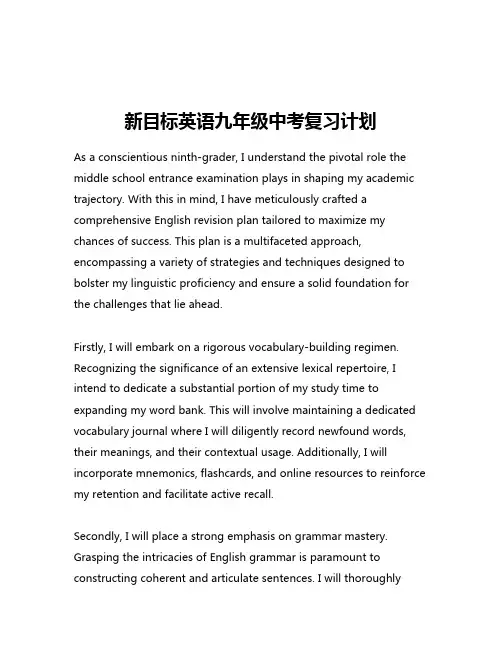
新目标英语九年级中考复习计划As a conscientious ninth-grader, I understand the pivotal role the middle school entrance examination plays in shaping my academic trajectory. With this in mind, I have meticulously crafted a comprehensive English revision plan tailored to maximize my chances of success. This plan is a multifaceted approach, encompassing a variety of strategies and techniques designed to bolster my linguistic proficiency and ensure a solid foundation for the challenges that lie ahead.Firstly, I will embark on a rigorous vocabulary-building regimen. Recognizing the significance of an extensive lexical repertoire, I intend to dedicate a substantial portion of my study time to expanding my word bank. This will involve maintaining a dedicated vocabulary journal where I will diligently record newfound words, their meanings, and their contextual usage. Additionally, I will incorporate mnemonics, flashcards, and online resources to reinforce my retention and facilitate active recall.Secondly, I will place a strong emphasis on grammar mastery. Grasping the intricacies of English grammar is paramount to constructing coherent and articulate sentences. I will thoroughlyreview the rules governing tenses, subject-verb agreement, and sentence structures. Furthermore, I will engage in targeted exercises and practice tests to identify and rectify any lingering grammatical weaknesses, ensuring a firm grasp of this critical aspect of the language.Thirdly, I will hone my reading comprehension skills. Comprehending and analyzing written passages is a cornerstone of the English examination. To this end, I will actively read a diverse array of materials, ranging from news articles and short stories to academic texts and literary excerpts. As I read, I will employ strategies such as note-taking, summarizing, and questioning to bolster my understanding and critical thinking abilities.Fourthly, I will dedicate ample time to refining my writing prowess. Effective written communication is a hallmark of English proficiency. I will practice formulating well-structured essays, narratives, and creative pieces, paying close attention to organization, coherence, and language use. Additionally, I will seek feedback from my teachers and peers, using their insights to identify areas for improvement and polish my writing skills.Fifthly, I will incorporate regular practice tests into my revision routine. These simulated examinations will not only reinforce the knowledge and skills I have acquired but also familiarize me with theformat, time constraints, and pressure associated with the actual examination. By analyzing my performance on these practice tests, I can pinpoint weaknesses and tailor my study strategies accordingly.Lastly, I will adopt a holistic approach to my preparation, acknowledging the importance of maintaining a balanced lifestyle. I will ensure that I allocate sufficient time for rest, recreation, and self-care activities. A well-rested and focused mind is crucial for optimal performance and retention.In conclusion, this comprehensive English revision plan is a testament to my unwavering dedication and commitment to academic excellence. By adhering to this strategic approach, I am confident that I will acquire the necessary knowledge, skills, and confidence to tackle the middle school entrance examination with poise and achieve the success I aspire towards.。
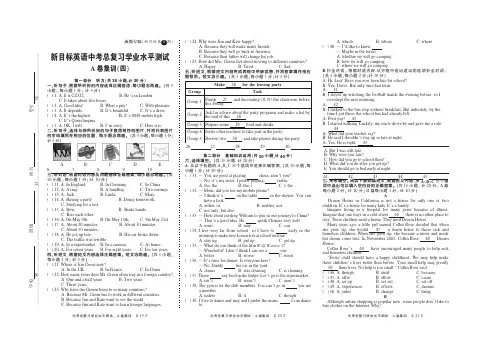
成都专版(新目标第4 期)新目标英语中考总复习学业水平测试A 卷集训(四)第一部分听力(共30小题,计30分)一、听句子,根据所听到的内容选择正确答语,每小题念两遍。
(共5小题,每小题1分;计5分)()1.A.It is CZ322. B.He ’s in London.C.It takes about five hours.()2.A.Good idea! B.What a pity! C.With pleasure.()3.A.It depends. B.It ’s beautiful. C.It ’s a dress.()4.A.It ’s the hi’hest.B.It ’s ’’4’meters hi’h.C.It ’s ’omolan’ma.()5.A.OK,I will. B.I ’m sorry. C.Here it is.二、听句子,选择与你所听到的句子意思相符的图片,并将代表图片的字母填写在相应的位置,每小题念两遍。
(共5小题,每小题1分;计5分)A BCDE6.7.’.9.10.三、听对话,根据对话内容及问题选择正确答案,每小题念两遍。
(共10小题,每小题1分;计10分)()11.A.In En’land. B.In Germany. C.In China.()12.A.A rin’. B.A handba’. C.)wo earrin’s.()13.A.Jack. B.Linda. C.Mary.()14.A.Havin’a party. B.Doin’homework.C.Studyin’for a test.()15.A.Bow. B.Shake hands.C.Kiss each other.()16.A.On May 9th. B.On May 15th. C.On May 21st.()17.A.About 20minutes. B.About 30minutes.C.About 50minutes.()1’.A.He ’ot up late. B.His car broke down.C.)he traffic was terrible.()19.A.In a supermarket. B.In a cinema. C.At home.()20.A.For seven years. B.For ei’ht years. C.For ten years.四、听短文,根据短文内容选择正确答案。
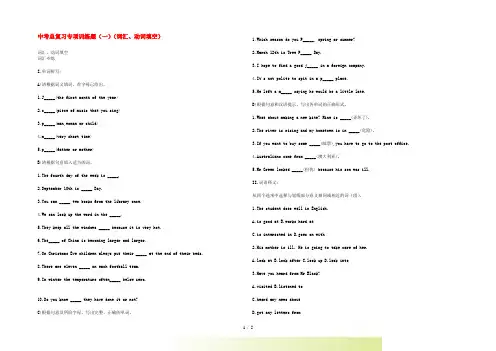
中考总复习专项训练题(一)(词汇、动词填空)词汇、动词填空词汇专练I.单词拼写:A)请根据词义填词,首字母已给出。
1.J_____(the first month of the year)2.s_____(piece of music that you sing)3.p_____(man,woman or child)4.m_____(very short time)5.p_____(father or mother)B)清根据句意填入适当的词。
1.The fourth day of the week is _____.2.September 10th is _____ Day.3.You can _____ two books from the library once.4.We can look up the word in the _____.5.They keep all the windows _____ because it is very hot.6.The_____ of China is becoming larger and larger.7.On Christmas Eve children always put their _____ at the end of their beds.8.There are eleven _____ on each football team.9.In winter the temperature often_____ below zero.10.Do you know _____ they have done it or not?C)根据句意及所给字母,写出完整、正确的单词。
1.Which season do you P_____, spring or summer?2.March 12th is Tree P_____ Day.3.I hope to find a good j_____ in a foreign company.4.It's not polite to spit in a p_____ place.5.He left a m_____ saying he would be a little late.D)根据句意和汉语提示,写出各单词的正确形式。
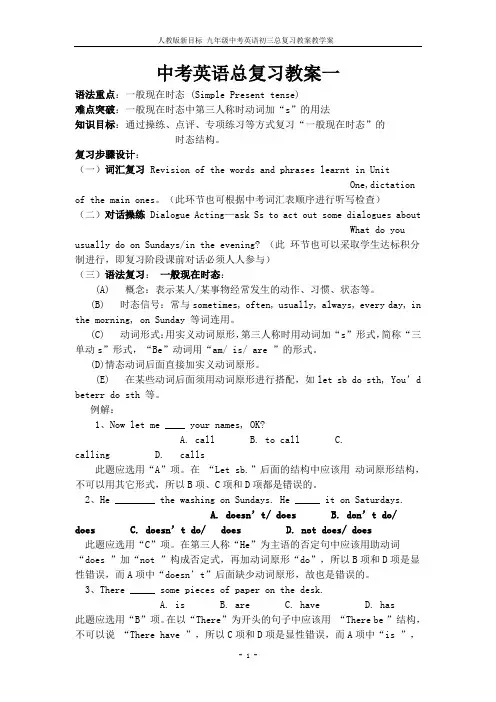
中考英语总复习教案一语法重点:一般现在时态 (Simple Present tense)难点突破:一般现在时态中第三人称时动词加“s”的用法知识目标:通过操练、点评、专项练习等方式复习“一般现在时态”的时态结构。
复习步骤设计:(一)词汇复习Revision of the words and phrases learnt in UnitOne,dictationof the main ones。
(此环节也可根据中考词汇表顺序进行听写检查)(二)对话操练Dialogue Acting—ask Ss to act out some dialogues aboutWhat do you usually do on Sundays/in the evening? (此环节也可以采取学生达标积分制进行,即复习阶段课前对话必须人人参与)(三)语法复习:一般现在时态:(A) 概念:表示某人/某事物经常发生的动作、习惯、状态等。
(B) 时态信号:常与sometimes, often, usually, always, every day, in the morning, on Sunday 等词连用。
(C) 动词形式:用实义动词原形,第三人称时用动词加“s”形式,简称“三单动s”形式,“Be”动词用“am/ is/ are ”的形式。
(D)情态动词后面直接加实义动词原形。
(E) 在某些动词后面须用动词原形进行搭配,如let sb do sth, You’d beterr do sth 等。
例解:1、Now let me ____ your names, OK?A. callB. to callC.calling D. calls此题应选用“A”项。
在“Let sb.”后面的结构中应该用动词原形结构,不可以用其它形式,所以B项、C项和D项都是错误的。
2、He ________ the washing on Sundays. He _____ it on Saturdays.A. doesn’t/ doesB. don’t do/does C. doesn’t do/ does D. not does/ does此题应选用“C”项。
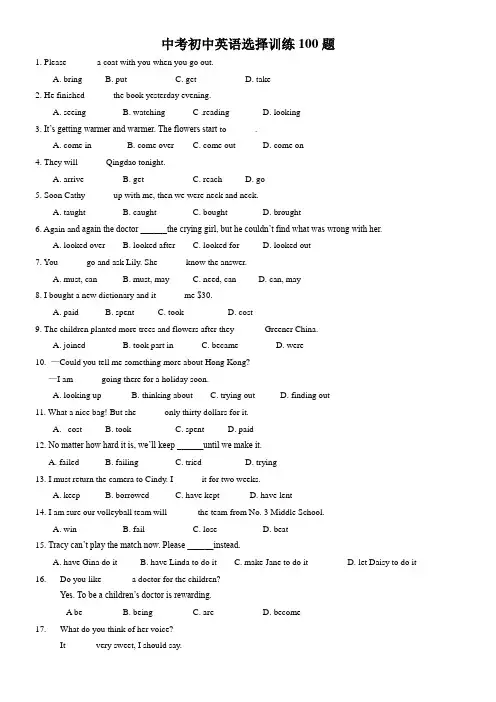
中考初中英语选择训练100题1. Please ______ a coat with you when you go out.A. bringB. putC. getD. take2. He finished ______the book yesterday evening.A. seeingB. watching C .reading D. looking3. It’s getting warmer and warmer. The flowers start to ______.A. come inB. come overC. come outD. come on4. They will ______Qingdao tonight.A. arriveB. getC. reachD. go5. Soon Cathy ______up with me, then we were neck and neck.A. taughtB. caughtC. boughtD. brought6. Again an d again the doctor ______the crying girl, but he couldn’t find what was wrong with her.A. looked overB. looked afterC. looked forD. looked out7. You ______go and ask Lily. She ______know the answer.A. must, canB. must, mayC. need, canD. can, may8. I bought a new dictionary and it ______me $30.A. paidB. spentC. tookD. cost9. The children planted more trees and flowers after they ______ Greener China.A. joinedB. took part inC. becameD. were10. —Could you tell me something more about Hong Kong?—I am ______going there for a holiday soon.A. looking upB. thinking aboutC. trying outD. finding out11. What a nice bag! But she ______only thirty dollars for it.A.costB. tookC. spentD. paid12. No matter how hard it is, we’ll keep ______until we make it.A. failedB. failingC. triedD. trying13. I must return the camera to Cindy. I ______it for two weeks.A. keepB. borrowedC. have keptD. have lent14. I am sure our volleyball team will ______ the team from No. 3 Middle School.A. winB. failC. loseD. beat15. Tracy can’t play the match now. Please ______instead.A. have Gina do itB. have Linda to do itC. make Jane to do itD. let Daisy to do it16. ----Do you like ______ a doctor for the children?----Yes. To be a children’s doctor is rewarding.A be B. being C. are D. become17. ----What do you think of her voice?----It ______ very sweet, I should say.A. hearsB. soundsC. listensD. sings18. ----How much does it ______to fly from Beijing to Qingdao one-way?----About 1,000 yuan.A. costB. payC. spendD. take19. ----Water-skiing and surfing are my favourite. How about you?----I ______surfing to water-skiing.A.thinkB. agreeC. wantD. prefer20. ----It’s more and more important to protect our earth.----I think so. If everyone ______a contribution to it, our world will be more beautiful.A. makeB. makesC. will makeD. make21.You ______swim in this part of the lake. It’s dangerous.A. mustn’tB. needn’tC. won’tD. may22. Jenny is a nurse and ______in Town Hospital.A. worksB. workedC. had workedD. working23. ----Where is Sandy?----He ______to ans wer the phone. He’ll be back in a minute.had gone B. has gone C. has been D. went24. ---- ______all your things, Mary! I hate them here and there!----OK, Mum.Put up B. Put on C. Put down D. Put away25. ----How do you go to work every day?----I ______on my bike.A. rideB. driveC. takeD. walk26. ----Oh, you painted the walls yourself?----Yes. It was not hard. The whole work didn’t ______.A. wantB. costC. spendD. pay27. ----How about going hiking this weekend?----Sorry. I prefer ______ rather than ______.A to stay at home, go out B. to go out, stay at home C. staying at home, go out D. going out, stay at home28. ----May I ______your Chinese-Russian dictionary?----Sorry, I ______it at home.A. borrow, forgotB. lend, leftC. lend, forgotD. borrow, left29. ----Your T-shirt looks nice. Is it ______wool?----Yes, and it’s a ______Inner Mongolia.A. made of, made byB. made of, made inC. made by, made forD. made by, made from30. Could you tell me how to ______it in French?A. sayB. speakC. talkD. tell31. Bob ______ nearly two hours doing his work yesterday.A.spentB. tookC. paidD. cost32. ----Would you please ______ this old lady?----Sure. Have my seat, please.A. take room forB. give a room forC. make room forD. have rooms with33. Jim was so busy ______ the answer from Lily’s paper that he forgot ______her name into his.A to copy, to change B. to copy, changing C. copying, to change D. copying, changing34. The young man broke his arm in the accident and had to ______his job.A. send upB. put upC. get upD. give up35. The woman hasn’t heard from her son for months. It ______ her a lot.A interests B. moves C. worries D. pleases36. It’s rather cold outside. Here’s a coat. ______, please.A. Pick it upB. Put it onC. Take it offD. Turn it down37. They are busy ______ ready for the exam.A. getB. gettingC. to getD. got38. ----What are you doing, Emily?----I’m ______the rad io. The music is so beautiful.A. watchingB. listening toC. hearingD. mending39. He ______the bus and found a seat next to the window.A.got downB. got offC. got onD. got out40. ----Do you think Jim will pass the Chemistry exam?----Sure. He ______a lot of time on it.A. tookB. costC. paidD. spent41. We enjoy ______ the moon in the open air on the Mid-autumn Day.A to see B. seeing C. to watch D. watching42. A lot of meetings were ______because of the dangerous disease.A. taken offB. put offC. turned offD. set off43. Would you please go and ______some water for me? I am thirsty.A. to bringB. to carryC. takeD. get44. ----HI, Pete! Why are you in such a hurry?----______the 7:30 train.A. CatchB. To catchC. CatchingD. Caught45. Alice, we are going to spend our holiday in Canada. If you ______, we can go to Italy instead.A. hopeB. wishC. preferD. agree46. ----Would you like to have a try?----Yes, very much. It ______to be exciting.A. seemB. is lookingC. seemsD. will look47. ----Mike! What are you doing there?----Listen, Mum! I hear somebody ______ upstairs.A going B. goes C. go D. to go48. It was raining heavily outside. The father made the children ______in the room.A. to stayB. stayC. stayingD. stayed49. After years of hard work, his dream ______ in the end.A came out B. came true C. came over D. came up50. ----Hello! Would you like to go to the concert with me tonight?----I’m sorry I can’t. Mother won’t ______me to go out in the evening.A let B. allow C. offer D. ask51. It took us a long time ______Hawaii but we thought the journey was enjoyable.A to get B. getting C. to reach D. reaching52. The teacher asked us to stop ______ because she wanted to tell us something.A talking B. to talk C. hearing D. to hear53. The car ______and stopped at the red traffic light.A got on B. got off C. slowed down D. picked up54. I think this is the best way to solve the problem. Do you ______me?A play with B. hear of C. agree with D. get on well with55. Let him ______ a rest. I think he must be tired after the long walk.A have B. gets C. to take D. has56.The film ______for ten minutes.A has begun B. has been begun C. has been on D. began57. ----Shall we go and ______hello to foreign teachers?----Good idea! Let’s go.A.sayB. speakC. shoutD. talk58. Our teacher did what she could ______us with English.A.helpB. helpedC. helpingD. to help59. We must do something to stop people from ______.A.to throw litter aboutB. to throw litter intoC. throwing litter aboutD. throwing litter into60. ----Have you ever ______Lintong to see the Terra Cotta Warriors?----Yes, I have.A.went toB. gone toC. been inD. been to61. I hope that you ______a good time this evening.A. haveB. are havingC. will haveD. had62. ----Hi, Carol, how was your trip to Disney World?----Hi, we ______a good time there.A are having B. have had C. had D. have63. I won’t go to the concert because I ______my ticket.A lost B. don’t lose C. will lose D. have lost64. The bottle is empty. Who ______the juice?A has drunk B. drinks C. drank D. is drinking65. The world ______. Things never stay the same.A. changesB. is changingC. was changingD. will change66._______ a cold morning, I opened the window and was glad to find that It was snowing outside.A. ByB. InC. AtD. On67. There is ________ today's newspaper.A. nothing new inB. something new onC. important something inD. nothing important on68. The headmaster _________ a noisy boy from the library.A. sent forB. sent outC. sent backD. sent away69. _______ it goes on, hour ________ hour.A. So, afterB. Such, byC. That, afterD. / by70. Silk ________ in _______ China.A. produce, the southeastB. is produced, southeastC. is grown, southeastD. is produced, the southeast of71. " Do you know if the old man is still living?" " I'm sorry. He _________. He ______ for two months.A. died, has diedB. has died, has been deadC. has been dead, diedD. has died, has dead72. Don't rush. There's still ______ time left.A. moreB. a lotC. a littleD. a few73. Would you please _______ fill the same bottle _______ full?A. not, too muchB. not to, too muchC. not, much tooD. not to, much too74. He asked ______ they would hold the meeting _____ it rained the next day.A. if, whetherB. whether, ifC. whether, whetherD. if, whether75. English is taught _________ a foreign language in almost all school in China.A. withB. byC. asD. for76. "Which boy do you want to see now? ""The _______ in the red hat."A. manB. personC. peopleD. one77. Peter could hardly see the words on the blackboard, ________?A. did heB. couldn't heC. didn't heD. could he78. The lady always ________ in white at the party.A. wearsB. dressesC. is wornD. gets dressed79. Britain is only 30 kilometers _______ from France.A. farB. far awayC. away farD. away80. Don't ask me to go with him, ________?A. shall weB. won't youC. will youD. don't you81. " You 've got a new dress, too" " Yes. Mine is _______ , but not so _______ as yours."A. better, cheapB. more better, expensiveC. better, more expensiveD. good, cheaper82. Lily was busy _______ ready for the exam and was made ______ in her room the whole afternoon.A. getting, studyB. get , to studyC. getting, to studyD. to get, study83. She didn't tell me ________.A. which room she livedB. she lived in which roomC. which room did she livedD. which room she lived in84. The _______now is that we have lots of ________ to ask.A. problem, questionsB. question, problemsC. question, problemD. problem, question85. Would you please speak slowly? I can hardly ______ you.A. talk withB. agree withC. followD. hear of86. Please let me know if you ________ your address.A. moveB. changeC. chooseD. find87. The sign “________” is usually seen on the box with glass in.A. PULLB. CLOSEDC.DANGERD. FRAGILE88. At weekends I prefer _______ at home to _______out.A. stay, goingB. staying, goC. staying, goingD. to stay, go89. The tree must ________ three times a week.A. waterB. is wateringC. be wateredD. waters90. They _______ some books from the library last week.A. lendB. lendsC. buyD. borrowed91. ---Do you still have a headache, Billy?--- No, it's ________. I'm all right now, mum.A. droppedB. runC. leftD. gone92. He is kind and always _______ his help to others.A. receivesB. bringsC. takesD. offers93. I'm sure our football team will ________ the team from NO. 3 Middle School.A. winB. failC. loseD. beat94. ---Most hotels are very full today.--- Don't worry! I have ______ a room already in the Changjiang Hotel.A. boughtB. bookedC. visitedD. seen95. To their _______, they all passed the exam.A. surpriseB. surprisedC. surprisingD. surprises96. ---Our English teacher often _____ us stories in class.--- Yes, he's so popular.A. tellsB. asksC. saysD. speaks97. They were all out _________ the missing child.A. foundB. to look forC. find outD. to look after98. The boy fell off the bike and ___________ on the road.A. liedB. lieC. layD. laid99. I think the headmaster is proud of us because he usually _________ us at thee school meeting.A. speak loudlyB. thinks highly C, is pride of D. speaks highly of 100. The funny boy _______ his pockets _______ sand.A. filled … inB. filled…withC. full…withD. full…ofKey:1----5 DCCCB 6----10 ADDAB 11----15 DDCDA 16----20 BBADB 21--25 AABDA 26--30 BADBA 31---35 ACCDC 36---40 BDBCD41--45 DBDBC 46--50 CABBB 51—55 CACCA 56—60 CADCD61---65 CCDAB 66-70 DAAAD 71-75 BCDBC 76-80 DDBDC81-85 ACDAC 86-90 BDCCD 91-95 DBDBA 96-100 ABCDB。
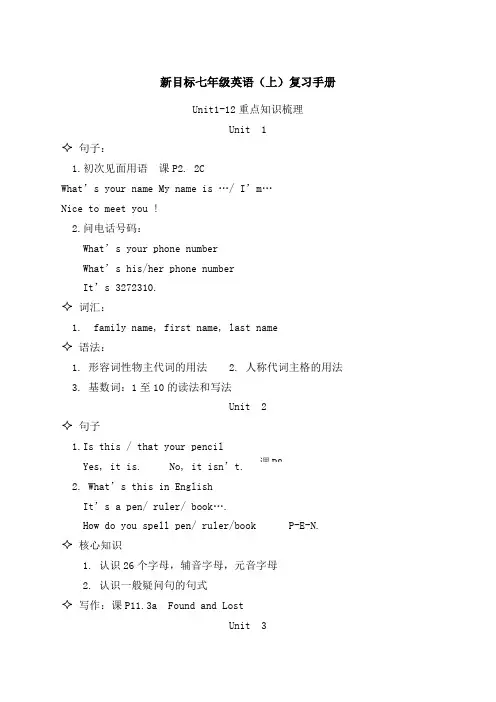
新目标七年级英语(上)复习手册Unit1-12重点知识梳理Unit 1✧句子:1.初次见面用语课P2. 2CWhat’s your name My name is …/ I’m…Nice to meet you !2.问电话号码:What’s your phone numberWhat’s his/her phone numberIt’s 3272310.✧词汇:1. family name, first name, last name✧语法:1. 形容词性物主代词的用法2. 人称代词主格的用法3. 基数词:1至10的读法和写法Unit 2✧句子1.Is this / that your pencil课P8Yes, it is. No, it isn’t.2. What’s this in EnglishIt’s a pen/ ruler/ book….How do you spell pen/ ruler/book P-E-N.✧核心知识1. 认识26个字母,辅音字母,元音字母2. 认识一般疑问句的句式✧写作:课P11.3a Found and LostUnit 3✧句子:1.介绍别人或某物This is …That is …These are …Those are …✧词汇:课P13 1a✧写作:1.学习英语信的格式2.课P17 以信的形式介绍相片中人物Unit 4✧句子询问地方Where is / are …?It’s …/ They are …✧核心知识1. 词汇课P24 12. take 与bring 的区别3. there be 的用法4. on the wall5. 介词:on , in , under , behind ,next to , between…and…6. 认识特殊疑问句的句式✧熟读:P23.3a , P24. 3 , Grammar FocusUnit 5✧句子1. Do you have …? Yes, I do. No, I don’t.2. Does he / she have …Yes, he / she does. No, he / she doesn’t.3. Let’s …4. That sounds good / interesting.That’s a good idea.5. Welcome to …✧核心知识一、there be 与have 的区别二、一般现在时用法1.现阶段经常性习惯性动作2.目前的状态3.客观真理常用时间状语sometimes, often, every day, usually, always 等构成1.动词用原形I like it.2.当主语是第三人称单数时,动词要加-s(-es)She likes it.He likes it.Ann goes to work.3.be 动词用am,is, areI am a teacher.He is a boy.They are girls.否定形式1.don’t+动词原形I don’t like it.They don’t like it.2.当主语是第三人称单数时,则为: doesn’t+动词原形He doesn’t like it.Ann doesn’t go to work.一般疑问句把do 或does 放在主语的前面,后面动词用原形Do you like itDoes Ann like itDoes he like it附:动词第三人称单数的构成规则情况方法例词一般情况加-s reads, says以ch, sh, x,s或o 结尾的词加-es teaches, guesses finishes以“辅音字母+y”结尾的词把y改为i再加-es fly--fliestry--tries carry--carries✧熟读课本:P25 1a , P26 G.F. , P27 3b,P28 1a , P30 1与3Unit 6✧句子询问所喜欢的东西1. Do you like….?Yes, I do. No, I don’t.2. Does he like … Yes, he does. No, he does.✧核心知识1.一般现在时2. 可数名词与不可数名词3. lots of4. go on picnic5. health, healthy, healthily6. P36 1✧熟读课本: P31 1a , P32 G. F. , P35 3a, P36 1Unit 7✧句子问价格1. How much is this T-shirt It’s 10 dollars.2. How much are they They are 100 dollars.问颜色1. What color do you want What color is it 购物用语:P39 3a1. Can I help you What can I do for you2. Yes, please.3. I’ll take it .4. Thank you.5. You’re welcome.6. Have a look.✧核心知识两位数的基数词读法与写法P40✧熟读课本P37 1c, P38 G. F., P 39 3a ,P40 1b, P41 3a , P42 1与3Unit 8✧句子1. When is your birthday2. My birthday is January fifteenth.3. What year were you born4. I was born in 1999.5. When were you born6. I was born in January first,1999.✧核心知识1.基数词和序数词基变序口决基变序有规律,词尾加上-th ;一二三特殊记,单词结尾t d d ;八减t , 九减e , f 要把ve替;ty 把y 改为i , 记住前还有e ;若遇到几十几,只把个位变序。
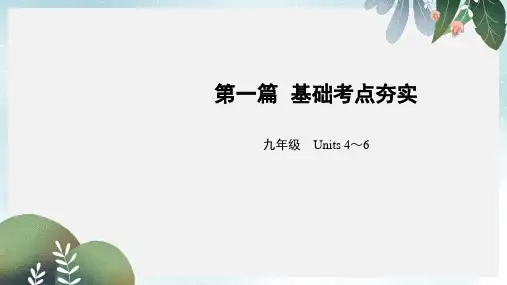
人教新目标初中英语中考总复习补全对话(七选五)专项练习一A: Hi, Zhou Ran.B: Hi, Gao Jie. 1.A: I’m going to the basketball club for training.B: 2.A: Twice a week.B: Who is your favorite basketball player?A: Zhao Jiwei, of course. 3. He has just won Most Valuable Player of the Finals. B: I still feel excited about Liaoning’s third CBA title (冠军),A: So do I. 4.B: Yes, I did. I went there with my father.A: 5.It’s not easy to get the tickets. By the way, would you like to go to the club with me?B: Sure, I’d love to.A: Let’s go!A.Did you go to watch the Finals?B.You are so lucky!C.When did you go?D.How often do you go to the basketball club?E.Who did you go with?F.Where are you going?G.He is so excellent.二(Xiaoyun and Fangfang talk with each other after class.)Xiaoyun: Hello, Fangfang! 6.Fangfang: Hi, Xiaoyun! I’m reading a book on saving the environment.Xiaoyun: Wonderful! What does the book say?Fangfang: Well, it gives good ideas about how to save the environment in our daily lives. For example, we can turn off the lights when we leave the room.Xiaoyun: Yes, that’s easy. 7.What’s next?Fangfang: We can ride a bike or walk. Don’t take a bus or a taxi unless we have to. Xiaoyun: Good idea. 8. What else can we do?Fangfang: We can also try to recycle paper.X iaoyun: Hmm…it does have a point! Some books, newspapers, magazines…we have plenty of paper at home.Fangfang: Another idea is to turn off the shower when we are washing our hair. Xiaoyun: I didn’t know about that! 9.Fangfang: Yes. Get your hair wet, turn off the shower, put the shampoo in your hair,then turn on the shower again and wash it out.Xiaoyun: You are right. 10. We have to save water. By the way, the book sounds good. Can you lend it to me after you finish reading it?Fangfang: Sure, no problem.A.Where are you going?B.Water is really important to us.C.You mean when I have shampoo(洗发剂) in my hair?D.What are you reading?E.That will save money, too.F.Take a bag when you go shopping.G.I always remember to turn them off when there is no need.三A: Three years has gone, and we will leave the middle school. 11.B: I’m excited because I’m going to enter a new school.A: 12. Everything is new in the high school.B. But sometimes I feel a bit sad. Because I have to say goodbye to my classmates and teachers.A: 13.B. That sounds good! 14.A: 15.B: I want to be a scientist like Qian Xuesen and Deng Jiaxian.A: Cool!A.Then what do you want to be in the future?B.How are you feeling?C.I have the same feeling.D.I’m sure those photos will bring me good memories in the future.E.I don’t know.F.Who’s your favourite teacher?G.You can take some photos with them.四A: Hi, Daisy. Next Sunday is my 15 birthday. I’d like to hold a party at my house. 16.B: Sure, I’d love to.A: Great! I’ll need your help. 17.B: Yeah. How many people will come?A: I don’t know. Maybe about 12.B: OK. You can give me a list of the names and 18. What about the food?A: Uh, I don’t think about it. 19.B: Yeah, sure. Are you going to have any party games?A: 20. Can you organize some?B: Hey, wait a moment. Is this your party, or my party?A: Haha…A.Would you like to come?B.I’ll help you with the invitations.C.Can you bring some fruit and snacks?D.Can you help me organize it?E.Sure, playing games is a good idea.F.I’m sorry about that.G.Sorry, I don’t like playing games.五Zhuoma: Hi, Zhaxi. 21.Zhaxi: I’m watching a movie now.Zhuoma: 22.Zhaxi: The Battle at Lake Changjin(长津湖).Zhuoma: Wow! It’s so popular! Almost everyone wants to watch it.Zhaxi: Yes, you’re right 23.Zhuoma: Not yet. I’d love to, but I have no time recently. What do you think of this movie?Zhaxi: 24.It showed us many heroes in the War to Resist US Aggression and Aid Korea (抗美援朝战争).Zhuoma: It sounds like an educational movie. I can’t wait to watch it.Zhaxi: You can watch it at 2: 00 P.M, I wish you have a wonderful experience. Zhuoma: Thank you!Zhaxi: 25.Zhuoma:A.Which movie?B.I really love it.C.You’re welcome.D.Do you like movies?E.What are you doing?F.Have you seen it yet?G.I went there with my mother.六A: How time flies! Here we are at the end of junior high school.B: Yeah. We have had three unforgettable years here. 26.A: Yes, I remember hurting my left leg while playing basketball in Grade 7.B: I remember that! 27.A: Yes. 28. I will miss her most after graduation.B: Me, too. She always encouraged and helped me so that I could do better in Math. A: She is really a good teacher. 29.B: Mr. Wang. 30. But he was kind to me and helped me a lot.A: We should be thankful to the teachers.B: I cant agree more.A.What do you remember?B.Other subjects are very easy.C.Miss Lee took you to the hospital.D.Do you have any special memories?E.She is a caring teacher and a patient friend.F.I had lots of difficulty in learning physics in Grade 8.G.Which teacher gave you the deepest impression (印象)?七A: Hi, Jenny! Have you finished reading the magazine?B: 31.Now I’m reading an article about China’s world-famous bridges. Come and take a look at the pictures of the bridges.A: How amazing! 32.B: Just two—the First Beipan River Bridge and the Hong Kong-Zhuhai-Macao Bridge. A: When did you visit the First Beipan River Bridge?B: In 2021. The bridge is very high. I couldn’t believe my eyes when I saw it.A: 33.B: Yes, the bridge stands 565.4 metres above a river.A: 34.B: The world’s longest cross-sea bridge is really a new wonder of the world. Last month, I took a bus to Hong Kong across the bridge. 35.A: That sounds great. I’m looking forward to visiting it.A.Not yet.B.You can’t imagine how fantastic it was.C.As a Chinese student, I feel proud of our country.D.How many of them have you ever visited?E.It is the highest bridge in the world, isn’t it?F.What about the Hong Kong-Zhuhai-Macao Bridge?G.It lies between Guizhou Province and Yunnan Province.。
语法专项突破专题九非谓语动词非谓语动词在句中不可单独用作谓语,不受主语人称和数的限制,在句中可以用作其他句子成分。
非谓语动词有三种形式:动词不定式、动名词和分词。
考点一动词不定式动词不定式在句中可以作除谓语以外的一切成分:主语、宾语、宾语补足语、主语补足语、表语、定语和状语。
1.动词不定式作主语时,往往用it作形式主语,而把真正的主语动词不定式置于句末。
常用句式:It is (not)+adj.+(for/of sb.)to do sth.。
To swim in the river is dangerous.=It's dangerous to swim in the river.在河里游泳是危险的。
2.作表语。
往往置于连系动词be,seem等之后。
My job is to look after my sister.我的工作是照看我的妹妹。
3.作宾语。
常见的后面接不定式作宾语的动词有:agre e,begin,start,dec ide,expect,learn,like,manage,pretend,want,try,wish,forget,remember,help等。
Don't forget to close the door.别忘了关门。
4.作定语。
动词不定式作定语时,要置于被说明和修饰的名词之后。
I have something to tell you.我有事要告诉你。
I need a house to live in.我需要一栋房子住。
5.作状语,表明目的、结果或原因等。
My little sister is too young to go to school.我的小妹太小而不能上学。
(结果状语)He opened the door for her to come in.他打开门让她进来。
(目的状语)6.作宾语补足语。
I expect you to write to me.我盼望你给我来信。
课时11.八年级下册Units 3~4高频考点突破考点1For one week, she did not do any housework and neither did I. 整整一个星期,她没做家务,我也没做。
考点2Could you lend me some money? 你能借给我点钱吗?考点3My parents don't allow me to hang out with my friends. 我的父母不允许我和朋友们闲逛。
考点4Why don't you go to sleep earlier this evening? 为什么今晚不早点睡呢?考点5Instead he watches whatever he wants until late at night. 相反,他想看什么就看什么,一直到深夜。
考点6You should explain that you don't mind him watching TV all the time.你应该解释下你并不介意他一直看电视。
考点7And they are always comparing them with other children.而且他们总是把自己的孩子和其他孩子对比。
随堂练习1.Mr. Li is ________(explain) to us how to organize our ideas according to the type of writing.2.With the ________(develop) of the science and technology, more and more people can pay the money by mobile phone.3.In many cases, we can not achieve anything if there is only ________(compete) and no cooperation.4.It's too hard for me to learn it. Can you show me how ________(throw) the ball?5.In order to win the first prize in the sports meeting, you should run as ________(quick) as you can.6.There is an ________(argue) between Ann and Emily because they have different opinions about this problem. 7.If you describe someone as ________(usual), you think that they are interesting and different from other people. 8.A hobby is ________(compare) to a special friend that you can choose for yourself.随堂精练一.单项选择1.I'm cooking breakfast for my ________ mother. She's ________ in hospital now.A.sick; sick B.ill; illC.ill; sick D.sickness; ill2.—When will he leave for Shanghai?—As soon as he ________ his work.A.finished B.will finishC.is finishing D.finishes3.—Did you watch TV last night?—No. I read a book instead of ________ TV.A.watching B.watchC.watched D.to watch4.—Could I smoke here?—Sorry. I am afraid you ________. Look at the sign “No smoking”!A.shouldn't B.couldn'tC.can't D.won't5.—In the past five years, China has played an important role in the Belt and Road.—It has ________ many nations a great chance to communicate.A.offered B.supportedC.included D.directed6.Their parents don't allow them ________ in the river because it's really dangerous.A.swim B.swimmingC.to swim D.swam7.The fallen ________ on the ground made the street more beautiful.A.leafs B.leavesC.leaf D.leave8.If you want to know more about space, please ________ the book A Brief History of Time.A.look through B.look aroundC.look after D.look down upon9.________ of the old days, I always feel sad and have tears filled with my eyes.A.To think B.ThinkC.Thinking D.Thought10.Tina was always the first student ________ her English exercises in our class.A.to finish B.finishedC.finishing D.finishes二.完形填空Once upon a time, there was a lazy poor man living in a small house with spider webs (蜘蛛网) on the walls and mice running around. People __1__ coming into such a dirty place and the poor man was lonely and sad every day. He thought it was poverty (贫困) that __2__ his unhappy life. One day, the poor man dropped in on a wise old man and asked him for __3__ about changing his life. The old man gave him a beautiful vase (花瓶) and said, “This is a magic vase that will bring you __4__.” The poor man looked at the vase __5__. Why would he need a vase in his poor house? However, he didn't want to __6__ such a beautiful vase, so he brought it home and put it on the table. “It's not right for something so beautiful to be __7__.” the poor man looked at the vase and thought. Then he picked some wild flowers and put them into it, making it even more beautiful. __8__ he was still not satisfied. “It is not good for such a beautiful thing to stand next to a spider web.” At this, he started to do somecleaning in the house and paint the walls. His house turned into a __9__ place immediately. The poor man __10__. He suddenly realized that in the past it was his laziness that made him poor and unhappy. From then on, he worked hard and his life got better and better.1.A.enjoyed B.avoidedC.forgot D.considered2.A.led to B.connected toC.made up D.set up3.A.service B.knowledgeC.advice D.care4.A.peace B.happinessC.mess D.regret5.A.sadly B.nervouslyC.proudly D.surprisedly6.A.throw away B.give outC.pay for D.keep off7.A.ugly B.full C.empty D.dirty8.A.Although B.ButC.So D.Because9.rge B.darkC.strange D.comfortable10.A.cheered up B.rang upC.sped up D.stayed up三.阅读理解AKent Wilson's alarm clock rings at 5:30 am every morning. Kent is a dog walker. People pay him to take their dogs for a walk. Kent picks up five dogs from their homes. He takes them to the park in his van. The dogs run around together and Kent throws balls and Frisbees for them. Sometimes he takes them to the beach. The dogs love to play in the water. After an hour, Kent puts the dogs back in his van. He takes each dog home. Then Kent picks up another five dogs. Kent takes fifteen dogs for a walk every day. “This job is very hard work, but I love it,” says Kent. “I love dogs and I take good care of them.” Kent takes dogs for walks in the rain and in the snow. He dries each dog with a towel before he takes it home. He feeds each dog when they arrive home. He stays with the dog until it finishes eating. Then he leaves. Kent also feeds people's pets when they are away. “I take care of all kinds of pets, cats, rabbits, mice and fish,” says Kent. “But I don't have any pets of my own. I don't have time to look after them!”1.Does Kent get money from people for walking their dogs?A.Yes, he does.B.No, he doesn't.C.Sometimes.D.It's not mentioned.2.Kent takes each dog for a walk for ________.A.30 minutes B.45 minutesC.an hour D.one and a half hours3.Which is NOT TRUE according to the passage?A.Kent takes dogs to the park and the beach to play.B.Kent takes 15 dogs a day for a walk.C.Kent also takes care of different kinds of pets.D.It's too hard for Kent to take dogs for a walk.BTony, a nine-year-old kid, is sitting at his desk when suddenly he wets (尿湿) his pants. He thinks his heart is going to stop because he can't possibly know how this has happened. It has never happened before. He knows the after-effect (后果)—When the boys find out, he will never hear the end of it. When the girls find out, they'll never speak to him again as long as he lives.Tony puts his head down and says to himself, “Oh, no. What can I do? I need help now!”He looks up and notices the teacher coming, with a look in her eyes that says he has been discovered.As the teacher is walking to him, a classmate named Emily is carrying a glass that is full of water. Emily falls down in front of the teacher and drops the glass of water in Tony's pants. Tony seems to be angry, but all the while he is saying to himself, “Thank you, dear! Thank you, dear!”Now all of a sudden, instead of being the person that everyone laughs at, Tony is the person of sympathy (同情). The person that everyone laughs at should be him, but now it is Emily.She tries to help, but they tell her, “You've done enough, you stupid!”At the end of the day, as they are waiting for the bus, Tony walks over to Emily and says in a low voice, “You did that on purpose, didn't you?”Emily says back in a quiet voice, “I wet my pants once, too.”4.What does Tony think the other boys will do if they find out the fact?A.They'll all laugh at him.B.They'll tell the teacher about it.C.They'll try to help him.D.They'll never speak to him again.5.Which is right according to the passage?A.Emily drops the water on purpose.B.Tony is really angry with Emily.C.Tony and Emily don't go home by bus.D.Tony and Emily aren't classmates.6.We know that Emily is a ________ girl from the passage?A.careless and lazy B.quiet and brightC.stupid and helpless D.kind and smart四.短文填空Once, there was a little girl named Meredith. Meredith enjoyed spending __1__ free time with her friends, but there was something different about Meredith. She was always __2__ in things like chemistry and history. Meredith never wanted to __3__ about these interests because she was afraid she would be judged (评头论足). She always learned more about these topics __4__ she was by herself, so no one could find out about this.One day, a new girl, Josie, joined her sixth-grade class, and the new girl was __5__ to make a self-introduction in front of the class and say three things about herself. Josie stood up and __6__ to talk about her hobbies. First of all, she said she enjoyed reading and writing stories in her free time. Second, she said she liked history. Third, she said she loved chemistry because she could do some amazing experiments in the lab. Meredith's eyes lit up __7__ joy. Finally, she had found someone who had common interests as her.Later that day, Meredith found Josie on the playground and ran over to talk to her. They immediately became __8__ and started to play at each other's houses on weekends.五.书面表达朋友在人的一生中非常重要,有的人总是可以交到很多不同类型的朋友,并且和朋友相处得很融洽,可以使其成为一生的挚友。
语法专项突破专题七 形容词和副词考点一 形容词、副语的句法功能不少学生对如何排列形容词的词序颇感困惑。
在此,我们向同学们介绍一个简易的记忆村子附近有一座漂亮的古代石桥。
I bought a cheap blue plastic pencil box yesterday.昨天我买了一个便宜的蓝色塑料铅笔盒。
They have got such a round brown wooden table.他们有一张褐色的木制圆桌。
考点三 形容词变副词的方法1.大多数形容词在词尾加ly。
careful —carefully ,quick —quickly ,bright —brightly2.以“辅音字母+y”结尾的形容词,把y 变成i ,再加ly。
easy —easily ,happy —happily ,lucky —luckily3.以“元音字母+e”结尾的形容词,去e 再加ly。
true —truly4.以le 结尾的形容词,去e 再加y。
terrible —terribly ,simple —simply ,possible —possibly考点四 形容词、副词的比较等级1.形容词和副词的比较级和最高级的概念和构成:英语中的形容词和副词常用三种形式来表达事物的等级差别,分别是原级、比较级和最高级。
大部分形容词和副词的比较级和最高级是在词尾加er/est或在词前加more/most,属于规则变化,但也有少数是不规则的变化。
先双写辅音字n is lesshe(1)比较级的特殊用法①比较级+and+比较级“越来越……”(“more+原级”构成的比较级用more and more+原级)China is becoming stronger and stronger.中国正变得越来越强大。
②the+比较级...,the+比较级...,“越……,就越……”The more we do for the people,the happier we'll be.我们为人民做得越多,我们就越幸福。
新目标中考英语知识点整理--语法语法:时态问题 (01)1.记住与各时态相关的“特征词”.2.表示“将来”的几种形式及基本区别:shall will be going to +动词原形be to do sth.be +coming (leaving, starting, reaching, returning…. be about to do sth.3.用于表示过去未实现的希望和计划的表达:A. should like to / would like to / would love to + 不定式的完成时态B. was / were going to do sth.(用过去将来时态表示原打算做什么.)C. was / were going to have done sth.表示未完成原来的计划和安排.D. expect , intend , hope , mean , plan , promise , suppose , think , want , wish...常用过去完成时态在这些词后接宾语从句或者接不定式的一般形式;或者用一般过去时态后面接不定式的完成形式表示过去未曾实现的愿望.E. wish that …had done sth.表示过去未曾实现的愿望F.情态动词should ,would, could, might, ought to等后接不定式的完成时,表示过去本该做,打算做,想做而未做的事情.G. had better / would rather + 不定式的完成时,表示一种过去的愿望.常译为“当初最好/当初真该....”II. 句型复习:1. would (should) you like to do sth. should love to do man as …such interesting books that … such rapid sth.feel like doing sth.would like to do sth.would like sb. to do sth. such a diligent man that …so diligent a man that …such a diligent progress that …so many (few) people t hat …so much (little) money that …so diligent (fast) that…diligent (fast) enough to do sth.so lazy (slowly) that he cannot …too lazy (slowly) to do sth.III.词汇:A. 常用动词用法 (01)agreesb. agree with + sb. / sb.’s opinion / what …同意某人意见sth. agree with sb.适合sth. agree with sth. 相一致,相符,和谐agree on (upon) sth.就...取得一致的意见agree with sb. on sth. 在...方面同意或意见一致agree to do sth. 愿意(同意)做...agree that….同意...是事实或应当如何注释:该词一般作为不及物动词用.表示“同意”时有三种表达法,with ①后接“人”②具体的观点和看法:opinion, plan, idea等;③what引导的从句.作及物动词用时,①agree to do sth. 愿意做...②agree that …同意...是事实或应当如何B. 短语记忆:according to根据 a lot of/lots of许多add up to加起来a few一些again and again一再,多次 a great deal许多all kinds of各种各样的 a little一些 a kind of一种…after all毕竟C. 记住下列动词并写出它们的汉语意思:absorb vt. accept vt.accompany vt.account v. act v.adapt v. add v.admit v. advance v.advise vt.afford vt.aim v. answer v.achieve vt. adopt vt.allow v.语法:时态问题 (02)4. 完成时态中瞬间动词的处理方法:A. 不合表示一段时间的时间状语连用.B. 将瞬间动词变成状态动词.C. 换用句型.It is….. since …did…5. 复合句中的时态问题:A.主句是现在时态,从句可是任意时态.B.主句是将来时态,条件状语从句中只能用现在时态.C.主句是过去时态,从句只能是过去的时态.6. 情景中的时态问题.这是近几年高考中时态考察的重点.关键是要对所提供的情景进行仔细认真的分析善于找到判断时态的依据.II. 句型复习:What’s wrong (the matter, the trouble) with …?Is there anything wrong (the matter ) with …?There is something (nothing ) wrong (the matter) with…?Something (Nothing ) is wrong (the matter) with…?in order that…may (might, can, could,…) …so that…can (could, may, might…) …;so as to (in order to) do sth.do (try) one’s best to do sth.do what (everything, all) you can do sth. what he said… all that he said…III. 词汇 A. 常用动词用法 (02)look link-v look + adj. (过去分词,名词,介词短语,)看起来,look about 四周打量look about for四处寻找look ahead预测未来look like看起来像look as if看起来好像look well看起来不错look sb. up and down上下打量某 look at看,望,看待look after照看,照管,照顾,负责处理look back on回顾, look down upon (on)看不起,蔑视look for找寻,自找(麻烦),look forward to盼望,希望;预计会有;look in作短时间的访晤(参观),look in on拜望,顺便来看望look into调查,了解,研究look on旁观,在旁边看look on … as…把...看作look out查找,找出;当心,注意 look out for当心,提防;找寻,注意;look over翻阅,审读;复习 look round审视,到处看看;回头望look through 翻阅,查看;读一遍 look to 照顾,注意,负责look up查出,了解;看望,拜访 look up and down 上下打量B. 短语记忆:and so on 等等 a number of许多a set of一套…as a result结果as well as也at any time任何时候at first首先 at least至少at once立即at the beginning of开头,开初C. 记住下列动词并写出它们的汉语意思:appear vi.apply v.appoint vt.appreciate vt. approach v.approve v.arrange v.assign vt. attack v.attain vt. attemp t vt.attend v.avoid vt.belong vi. bend v.blow v.考前知识清理03I.语法:定语从句1.引导词的功能:A. 引导定语从句B. 代替先行词在定语从句中充当某一句子成分.2.引导定语从句的连词用法:连词主句中先行词是在从句中充当的成分是who人主语whom 人宾语whose 人或物定语(该词后要跟名词)that人或物主语,宾语,表语which 物主语,宾语(还可以引导非限制性定语从句)where 表示地点的名词地点状语 (=介词 + which )when 表示时间的名词时间状语 (=介词 + which )why reason原因状语 (= for which )as 在限制性定语从句中常和such…as,the same…as等句型连用.在非限制性定语从句中,可以代替主句中的某一成分或整个句子的意义.3. way 后面的定语从句可由in which , that 引导,或者什么都不要.4. that 在使用中的特殊要求.5. 限制性和非限制性定语从句的区别.6. as 与which在引导非限制性定语从句的三点区别;as常和know, see, understand, expect等词连用;可位于句首;常译为:正如....II. 句型复习:1. would rather (not) do sth; would rather do sth. than do sth.would rather sb. did (had done) sth; prefer sth. to sth. elseprefer doing sth. to doing sth. else;prefer to do sth. rather than do sth; insist on doing sth. rather than do sth.2. No matter what (whatever) he does…;No matter how (However) difficult it is…3. to one’s surprise (delight,satisfaction,disappointment, joy) What surp rises (delights, satisfies, disappoints, pleases) one is…III.词汇:A. 常用动词用法 (03)appear vi. link-v. = seem 似乎, 显得appear to do sth. appear + adj.appear + doneappear + sth. It appear that….B. 短语记忆:at the edge of在…边缘at the end of 在…末尾at the moment此刻at the same time同时 a variety of 各种各样的be annoyed at生…的气be busy with 忙于…be divided into 分成…be fit for 适合… be fond of爱好be full of充满… be grateful for感谢be interested in对…感兴趣; be known for因…出名 be made up of由…组成be satisfied with对…满意C. 记住下列动词并写出它们的汉语意思:bother v.build vt.buy vt cease v charge v.change v.check v.choose v. clear v.close v. collect mit vt.compare v.concern vt.consider v.consist vi.考前知识清理04 句型复习:4. It seems that sb. do sth. = sb. seems to do sth.It happened that sb. do sth. = sb. happened to do sth.It is said (reported) that sb. do sth.= sb. is said (reported) to do sth.5. Half of the visitors are …Half of the wood is …; Most of the teachers are…Most of the water is …; The rest of the books are …The rest of the money is …One-fourth of the population in the world are Chinese.The population of China is larger that that of any othercountry in the world.Three-fourths of the workers in the factory are men.Three-fourths of the surface of the earth is the sea.A larger number of students are…The num ber of the students in our school is…II. 词汇 A. 常用动词用法 (04)make make sth. 做,制造 make sb. do sth. 使得...make sb. (sth.) done make sb. (sth.) + adj.make sb. (sth.) + n. make it + adj.(n.) + that...make it + adj.(n.) + to do sth.make it + adj.(n.) + doing sth. make a dash for 赶往...,冲向...make a deal with 达成协议,做成交易make a decision 作出规定make a face = make faces做鬼脸,做苦相make a good effort 作很大的努力make a record 录制唱片 make a plan for 为…作计划make a note of注意;记下来make an impression on 给..留下(某种)印象,引人注目make fun of 取笑,和...开玩笑,嘲笑make ...into..把...做成...;使成为,使变成be made into...be made from..由...做的(化学变化)be made of..由...做的(物理变化)make it按时到达某处,办事成功,约定时间,及时赶上(火车,轮船等)make one’s living 维持生活make progress 取得进步make out 看清楚,看出,辨识;理解,明白;开(账单,收据等)进展;假装,装出, 把...说成是make room (for)让地方,让位置 make sense有道理,好懂,有清楚的意思make sense of 理解;make sure that...弄肯定,一定要做到;弄确切,弄清make sure of make sure to do sth.一定要做...make ... to one’s own measure 依照某人的尺寸做make up 创造,编造;弥补,把...补上;化妆,打扮make up for弥补; be made up of 有...组成(构成)make up one’s mind to do sth.打定主意,决定,决心make use of 利用B. 短语记忆:be similar to 与…相同be unfamiliar to与…不熟悉be used to V-ing习惯于because of因为;by hand手工做的; carry out 执行,进行catch up ﹙with﹚赶上;clear off清除,跑开;compare…with与…比较; concentrate on聚精会神…consist of 包含; deal with 处理,对付devote oneself to献身于…;die out 绝种divide…into 把分成do harm to 伤害…draw a conclusion 得出结论C. 记住下列动词并写出它们的汉语意思:construct vt.continue v.contribute v.control vt. convince vt.cost vt.count v.cover vt. create vt.cross v. crowd v.cry v.deal v.decide v.declare v.defend vt.考前知识清理05I. 语法复习:状语从句引导时间状语的连词:after, as, before, once, since, till, until, when, whenever, while, as long as, as soon as, hardly(scarcely) … when, No sooner … than, the time (moment, instant, minute, day…)备注: 1.hardly, no sooner在句首,引导的从句要部分倒装.2.since引导的从句注意看启动词是否是瞬间动词还是延续性动词.3.when 引导的从句注意其特殊用法.一些名词也可以引导时间状语从句.引导地点状语的连词:where , wherever备注:后者表示强调.引导方式状语的连词:as, as if, as though,备注:as引导的方式状语从句多在句首.引导原因状语的连词:because, since, as, now (that)备注:语气一个比一个弱.for可以引导原因状语从句,但它只能位于句末.引导结果状语的连词:so …that, such (a)… that, so that, that备注:so…that中的so在句首,主句要部分倒装.引导目的状语的连词:so that, in order that, that, so,备注:so that 使用最普遍.引导条件状语的连词:if , unless, in case , as long as,备注:注意分清if从句中是否该用虚拟语气.引导让步状语的连词:though, although, even if, even though, as, in spite of the fact, while, no matter wh- ,备注:as 引导的让步状语从句要倒装.II. 句型复习:1. It is + 被强调部分 + that ...在句型 1 中,将被强调的部分放在前面,其它部分置于that之后.被强调部分可以是主语,宾语,表语或状语.强调的主语如果是人,that可以由who换用.如果把这种句型结构划掉后,应该是一个完整无缺的句子.这也是与其它从句区别判断的方法.2. It is not until + 被强调部分 + that ...句型2 主要用于强凋时间状语,译成汉语"直到...才...",可以说是 not ... until ... 的强调形式3. It is clear ( obvious, true, possible, certain....) that .....句型3中it 是形式主语,真正的主语是that 引导的主语从句,常译为"清楚(显然,真的,肯定...)"是主语从句最常见的一种结构.III.词汇:A. 常用动词用法 (05)consider 考虑 consider that...consider what (how) to do sth. consider doing sth. 认为 consider that... consider sb. (sth.) + sb. (sth.) consider sb.+ adj. 把…看作是consider sb. to be...consider sb. + p.p.consider sb.+ 介词短语consider ... as 把(某人)看作B. 短语记忆:either…or既…又for a moment一会儿for a while一会儿for example 例如for instance例如from time to time不时hand over递过去in a hurry 匆忙in case万一in front of在…前面in line排队in no mood 无心思(心情)in other words换言之in spite of尽管instead of代替in the course of 在….期间(过程)C. 记住下列动词并写出它们的汉语意思:delay v.delight v.deliver vt.demand vt. deny vt.depend vi.deserve vt.design vt desire vt.destroy vt. determine vt.develop v.devote vt.direct vt.discover vt.discuss vt.考前知识清理06I. 语法复习:主谓语一致 011。
题型专题探究专题二十完成对话1.完成对话题是考查日常交际用语在各种情景下的实际应用,旨在考查学生在具体的语言情境中正确运用语言进行交际、准确表达观点或看法的能力。
2.中考对完成对话的考查重点是:(1)日常交际项目,特别是问路、打电话、购物、看病、就餐和谈论天气等六种情景中的表达方法;(2)生活常识及英语国家的社会、历史背景、风土人情等;(3)常用词汇的书写、习惯用语、固定搭配及语法知识。
3.考查的方式主要有:填空型完成对话。
这类题目要求根据上下文的意思完成对话,在横线上写出所缺少的句子。
这类题属于主观性题,难度较大,开放性较强,但要根据情景对话的内容用适当的句子来完成,而不是脱离语境任意地发挥,同时还要注意句子的语气、时态、词语搭配等问题。
有很多题目属于开放性试题,答案不唯一,只要语法正确、通畅达意就可以。
同时,还应该注意以下三个方面:1.通读对话,检查验证把填好的答案代入整篇对话,查看所填内容在逻辑上是否合理,语法结构上是否完整,是否符合英语习惯,是否流利自然,等等。
2.重视语境与文化差异任何文化都有自己民族的特征。
因此不能按汉语的思维习惯和表达方式去理解和运用英语。
3.特别留意标点符号标点符号虽小,但作用巨大。
在做题时,它往往是我们选定答案的重要依据。
【例】(2012湖南岳阳中考)Zhang Min—the monitor Lin Feng—a studentZ:Hi,Lin Feng,I want to have a clas s party before we leave the Junior Middle School.L:That's cool.Z:76.______?L:Yes,I will.Linda can also come and help.77.______?Z:Hmm...Let's have it on June 25.We'll have a fiveday holiday and come back to school on that day for our report cards.L:78.______!What can we do at the party?Z:79.______.L:Play party games and have a basketball match?That sounds exciting!Z:Linda and I can do things for the basketball match.So would you help me with the party games?L:Sure,80.______.I can't wait.参考答案:76.Will you come/Will you come and help me/Will you help me(organize it)77.When shall/will we have the party78.Good idea/OK/All right/That's good/Great/Wonderful79.We can play party game s and(then)have a basketball match80.I'd like/love to/Th at's no problem/I can do that/I'll do that/I'm glad to do thatA(2012湖南郴州中考)A:Go od morning,Bob.B:1.______!Lucy.A:Bob,I haven't seen you for a long time.Where did you go?B:2.______.A:Sanya?How was the weather there?B:3.______.A:What did you do there?B:I went to beach with my family.We had great fun playing in the water.A:4.______?B:We stayed there for a week.A:5.______?B:Yes,the food is very delicious.A:You are so lucky.B(2012湖南衡阳中考)A:Can I help you?B:Yes,please.6.______?A:We have many different kinds of skirts.7.______?B:I'd like the black one.8.______?A:Sure.Wow,you look beautiful in it.B:Thank you.9.______?A:Twenty dollars.B:OK.10.______.Here's the money.CA:Good afternoon,Tom.Where are you going?B:11.____________.A:Oh,to buy books?You are out! Why not go to the Readers' Room?B:The Readers' Room?12.____________?A:It is a place where students can exchange their old books with others.B:That sounds great! 13.____________?A:It's next to Renmin Hospita l,across from City Park.B:Oh,it's a little far.14.____________?A:You can take No.7 bus.B:How long does it take?A:15.____________.B:Ten minutes isn't a long time.OK,I will go there.Thanks!D(2012湖南湘潭中考)A:What are you going to do on vacation?B:I'm going to Sh enzhen to see my parents.16.______?A:I'd like to go on a trip.B:That sounds great!17.______?A:London.B:Really?You're a lucky guy.You can watch the Olympic Games in London.18.______?A:I'll go with my parents.B:19.______?A:For three weeks.We'll get back in late August.B:Well,20.______!Send me a postcard from London.A:Sure.E(2011湖南湘潭中考)A:What are you going to do after the exams?B:21.______.Do you have any good ideas?A:Yes,I want to relax myself.So I want to go on a trip.B:Sounds great!22.______?A:I'd like to go somewhere interesting and exciting.B:There is a new zoo in Changsha.23.______?A:No,I haven't.What about you?B:24.______.But my cousin went there last week.He told me people could watch the animals there in a more natural environment.A:Really?That sounds interesting.Let's go to the zoo together.B:OK.We can go there by bus tomorrow.A:25.______?It's not too far from here.And riding a bike is a kind of good exercise.B.OK.I can't wait.FA:Li Hua,the summer vacation is coming.26.____________?B:I'm going to visit my grandparents in the countryside.A:Oh.I've never been to the countryside.It must be fun.B:Of course.27.____________?A:I'm going to visit some famous universities in Beijing.B:28.____________?A:I'm going to Tsinghua University and Peking University.By the way,how will you go to the countryside?B:29.____________.A:I hope you'll have a good time.Will you ple ase email me some photos of countryside?B:30.____________.参考答案专题二十完成对话专题提升演练A1.Good morning/Morning2.I went to Sanya/Sanya3.It was sunny/It was hot/Sunny/Hot/...4.How long did you stay(there)5.Was the food(very)delicious/...B6.What kind of skirts do you have7.What color would you like8.Can I have a try9.How much is it10.I'll take itC11.I'm going (to the store) to buy some books/I'm going to the bookstore/To buy books/To the book store(book shop)12.What (place) is it/What is the Readers' Room13.Wher e is it14.How can I get(go) there/Which bus can I take15.It takes ten minutes (to get there)/About ten minutes/Ten(10) minutesD16.what about you17.Where are you going18.Who are you going with19.How long are you staying there20.have a good timeE21.I've no idea/I'm not sure/I don't know/I'm going to...22.Where would you like to go23.Have you ever been there24.Me neither/Neither have I/I haven't been there,either25.Why not ride a bi ke/Why don't we ride a bike/What about riding a bikeF26.What are you going to do27.Where are you going28.Which universities will you visit29.By bus/By car/By bike...30.Thanks,I will.。
新目标英语中考总复习文档编制序号:[KK8UY-LL9IO69-TTO6M3-MTOL89-FTT688]从中考命题看初三英语复习2007年5月27日,我参加了由市教科院牵头组织的中考命题小组进行了为期23天的命题工作。
在整个命题过程中,我看到了教育局、教科院领导、教研员以及各位老师对命题的高度负责的态度。
对于英语来说,每一个试题,每一个单词、标点,我们都进行了详细的核对与审核,对每一个可能产生误解的答案反复推敲,直到完美无缺,没有任何问题。
英语考试刚结束后和在改试卷期间,我打听了老师对试卷的评价,大家一致认为试卷贴近学生实际,命题深浅度的把握较好,在整体型上体现了能力的升华,在阅读上体现了阅读的技巧与能力的完美结合。
在任务型阅读上,文章设置简单,但能力要求较强,并注重学科渗透。
体现了中考的思路,而且鼓舞了学生的学习积极性,对后期的教学工作有一定的指导作用。
作文与学生生活关系密切,符合学生的实际情况。
学生有话可说,具有实用性。
这是我第一次参加市中考考试命题,学到了许多东西,也给了我很多启示,觉得自己的水平还有欠缺,看到自己的不足。
我想以后,我会加倍的去研究教材,研究中考,更好的服务教学。
下面我从命题人和教学第一线教师的角度谈一谈命题的感受、部分老师教学行为与考试要求的偏差、及如何提高后期的复习质量。
初三英语教学进入总复习阶段后,如何通过短时间的复习,做到事半功倍,是摆在我们全体初三学生和科任老师面前紧张而艰巨的任务,也是值得我们研究和讨论的问题,面对中考,有些教师和我本人一样感到压力很大,想方设法、争分夺秒、通过大量的练习,去提高教学质量,而不注意自己的教学行为与考试要求的偏差,采用一些过急的措施,使部分学生产生厌学了情绪,造成了严重的两极分化。
如何提高质量,特别是今后的复习质量,下面我就粗浅地谈一下自己对复习的一些看法,与各位同仁探讨,欢迎批评指正。
首先,充分了解分析学生的现状,制定一个合理的复习计划。
初中英语三年共七本书(除Starter外,共34个单元、12个模块)语言知识复杂,内容繁多,我想我们应该根据《英语课程标准》的要求,在复习课上教学的重点是教会学生复习的方法,倡导学生主动参与,乐于探索,勤于动手,培养学生收集、处理信息的能力,分析和解决问题的能力;发展学生观察、发现、联系、对比、总结、归纳的认知学习、迁移学习和行为习惯等方面的学习能力。
坚持以本为本的原则,着重把握中考要求及考试范围,对《中考说明》要反复研究。
整个复习大致分为三个阶段,也就是“三轮复习”。
第一阶段:“依标靠本、温故知新,构建牢固的基础知识网络”这是夯实基础阶段,将课本中的重要的知识点条理化、系统化地再次呈现。
这个阶段学生要有效的做好笔记,记录自己薄弱的或未完全掌握的。
教师要充分研读《英语课程标准》和《中考说明》,在语言知识上,不但要重视词汇和语法,特别要注意66个功能意念项目表和24个话题项目表中五级的目标要求;在语言技能上要注重“听、说、读、写”的能力培养。
认真备课,用好教学案!学生在复习每个单元所学内容,着重点放在每个单元的Reading, Grammar, Integrated skills和Main task,熟记单词及重要的短语、词组,并将它们融入到具体句型及课文中一起记忆,对那些平时疏漏过的单词要重点记忆,必要的辅以听写作为检测学生的手段。
第二阶段:“分类复习,突出重点,提升系统知识的运用水平”这是强化阶段,通过练习查漏补缺,及时解决存在的问题,学生要做好错题本,及时的提问。
这一阶段应在总揽教材,对基础知识掌握得比较扎实基础上,充分发挥学生的主观能动性,以教师总结为辅,学生复习为主。
所复习的内容包括冠词、名词、代词、数词、形容词、副词、介词、连词、动词、句子等。
对学生已掌握的内容少讲或不讲,对学生不够熟练的要重点讲,每复习一个项目,让学生找出与知识点相关的问题,寻找专项练习。
做到项目有专练,人人有所得。
通过这一阶段的复习,使学生对每项内容得以全面、系统地巩固和提高。
第三阶段:“紧扣题型,讲练结合,提高全面的应试能力和技巧”这是一个综合训练阶段,是模拟实战演习阶段,从知识到能力再到心态进行全面的考察和训练。
专项训练仅仅是就某一个知识点的单纯训练,在此基础上,我想我们应紧扣中考题型,对学生进行综合运用能力的训练,即有选择地进行听力、笔试为一体的成套试题的训练。
通过对学生限时测试,使他们把所学的知识上升为综合运用能力,逐步适应中考要求。
在以上这些阶段,学生要根据自身情况配合老师,教师要想方设法最大程度地调动学生的学习积极性,相信大家一定会学有所获。
几点建议:根据07年参加中考命题的体会,对各地区历年的中考试卷,试题类型结构的认真研究,我认为对学生每一种答题思路和方法加以指导,力求对不同内容采取不同方法,我们应该注意以下几点:一、听力:每年的英语测试卷中都有听力测试,听力测试目的在于检测学生理解和获取信息的能力。
虽然听力题型多样,但是对话理解和短文理解是最为常见的题型,也是听力中的难点,容易失分,在做题时予以重视。
做听力理解一般采用以下步骤:1.捕捉测试信息:试卷发下后,充分利用听前的几分钟时间,马上阅读“听力测试”部分,了解题意,把握所给问题与选项,这样可以有助于预测听的内容和重点,做到心中有数,尤其是长对话理解题,往往能透过选项内容,推断对话涉及的内容。
2.边听边速记要点:听录音时,边听边记对解题大有好处。
根据问题记下对话中的地点、人名、数据等。
3全面倾听,获取信息:在听对话时,要跟着录音全面倾听,听时要带着问题获取答题的信息。
听力要求考生从头到尾往下听。
如果因一题或一两处未听清而卡住,应马上排除干扰,否则就会跟不上录音而漏听。
4明辨话题,理解内容:听音时,要从获取的信息中判断语境,若判断错误就会影响作答。
如打电话和普通对话就有很大的差别,说“我是李明”,电话用语是 This is Li Ming (speaking)。
日常用法是I’mLi Ming.建议多听一些英美人士的原版录音。
平时就要多加强训练,尤其是中考前的一个月,应加强训练,做到每天都有听力练习,以便提高听力应试能力。
二、单项选择:单项选择题注重语言的实用性,交际性,在一定的语境上考查冠词、数词、名词、形容语、副词,动词等;着重考查学生对词汇、语法、习惯用法、日常用语及综合运用英语知识的能力。
单项选择题的设计由传统的单纯考查语法知识逐渐向英语应用的方向发展,不是孤立地考查学生对语言知识的识记能力,而是考查学生在真实情景中正确、合理使用语言的能力;注重语言的真实性、趣味性和实践性,体现了语言的交际功能;题干语言丰富,知识覆盖面广。
三、完形填空:完形填空题立足语篇,注重动词,名词,形容词,副词、介词等语义辨析和语义理解能力的考查,淡化文字层面的知识,强化从全文的整个角度去分析,去归纳,去猜测,考查学生的思维能力。
同时也设计了一些“功能性”选项。
部分题目采用后线索的命题方法,要求学生必须对整篇文章做出推断、归纳和整理后得出答案。
做此题型要从以下几个方面入手。
(1)重视首句的开篇启示作用。
(2)通读全文,弄懂大意。
(3)符合短文内容,遵循语法规则。
(4)复读全文,核定答案。
四、阅读理解“阅读理解”题的题量大、分值高,是考查学生综合运用语言能力的重点题型。
选材特点:题材多样化,随着信息时代的到来,阅读内容更趋于信息化、时代化,突破了单一的故事、寓言等题材,内容涉及新闻、广告、科普、医疗、教育等,文章的体裁从记叙扩大到产品说明、逻辑推理及实际应用等文体。
做阅读理解的步骤及技巧:(1)审视标题。
标题是文章内容的凝聚,它会给我们启发和想象,可预测文章的内容,有利于理解,提高做题效率。
(2)首先通读全文,迅速抓住文章内容,在不影响理解的前提下,尽可能快速阅读,并重抓住主要信息。
(3)阅读短文后的选择题,包括题干和选择项,明确问题的要求后,再细读全文或有关段落,最后选定答案。
若阅读材料较短,先读材料,后读题目。
这样能够掌握内容,获取总体印象,避免主观臆断,断章取义;若阅读材料较长,可先读题目,然后看材料,这样就可带着问题读,加深理解要点。
(4)答完一篇短文的全部题目后,再把短文读一遍,逐一核对答案。
常见题型:(以07盐城中考英语试题为例)1、主旨大意题阅读理解是对整个文章的目的、意图、观点、立场、态度以及内在的逻辑关系的理解,而不是断章取义的一孔之见,所以统览全篇和问题是很有必要的,这些问题会给你提供信息或暗示文章中的一些重要细节。
在统览全篇的同时要注意抓住文章的中心大意,捕捉主题句,因为一些显性的答案是可以从主题句中直接回答,而隐性的答案则是要通过对全篇的理解才能得出。
主题句一般具有以下特征:1)概括全段思想。
2)一般位于段首、段尾或位于段中,它通常是用单词、短语表达的。
当然,有些短语没有完整的主题句,其主题只好依据整篇文章及上下文的语境,不是某句话的表面意思。
3)解这种题目时,不能只凭文中的只言片语而断章取义,比如涉及文章的标题(title)、主题(main idea)、结论(conclusion)、结局(end)等有关问题,都需要在细读全文的基础上,结合所学语言知识、背景知识、生活常识、科学专业知识进行逻辑思维、推理、判断,从而获取文章中内隐的信息。
典型例题:如:第Ⅲ篇第56小题:The best title for this passage is_______________.A. I love my bedroomB. My family and my houseC. Houses in EnglandD. Inside an English house答案为D。
作者用图文形式介绍了一个英国家居,从Kitchen、Bathroom到Bedroom都做了相关的介绍,如果学生把握了这类题型的特点就很容易得出结论。
如:第Ⅳ篇第59小题:The passage is mainly about ________ .A. education in AfricaB. Children’s school life in AfricaC. the Internet in AfricaD. children’s daily life in Africa答案为D。
全文从所给的三个小标题Education、Daily fun和Internet就能可排除其它三个选项。
2、推断题这种题目有一定难度,往往不能直接从文中找到答案,而必须根据上下文及其相互间的关系或对整篇文章进行深层理解后,才能找到答案。
有时甚至还得联系作者的态度、观点、意图、语气等弦外之音、文外之意加以推理,这些题目一般都是深层意义的题目,他们没有明示,大多数属于模糊性的,甚至是模棱两可。